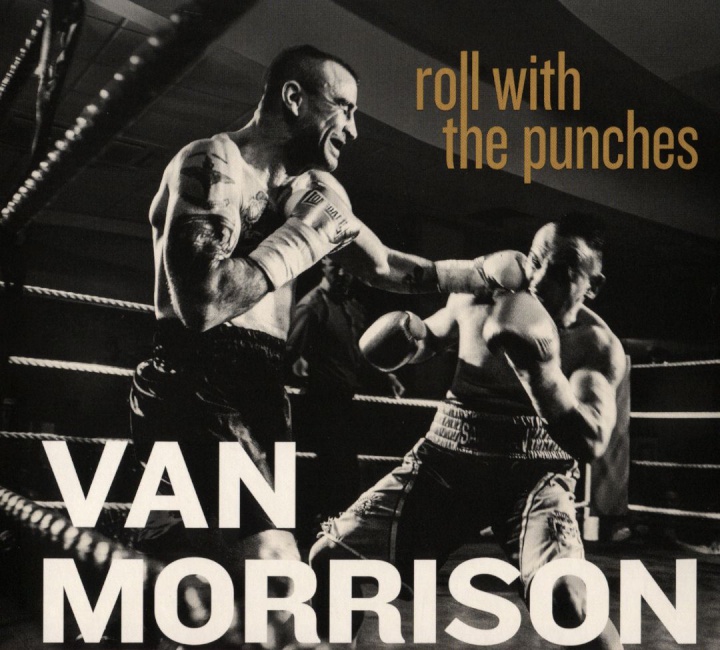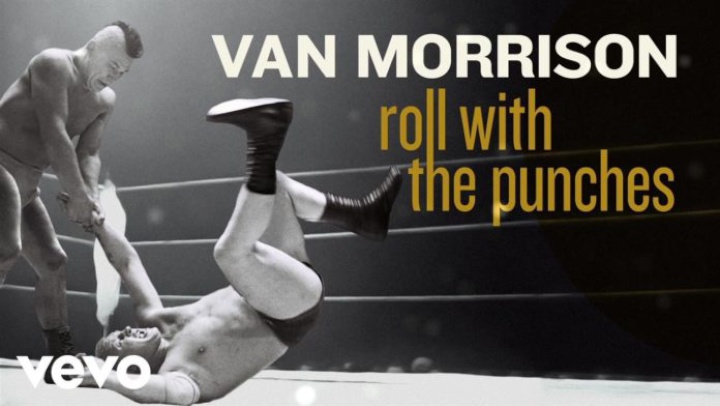
There are traditionally three or four
different Van Morrisons at any given time, depending on the
album. His more recent recordings reflect as many musical
angles as can fit within the seventy minute CD format: R&B,
jazz, folk, soul, and blues, sometimes interchangeably,
sometimes in thoughtful combinations. It may be difficult to
determine whether Morrison’s relentless swerving between
genres is part of some deeply meaningful design, or if he's
just working through familiar modalities, but it’s always
rewarding to listen to songs in which his Irish brogue
sounds suspended in the slow-motion whirl of a snow globe,
followed by another in which he chomps through the heave and
shudder of the electric blues.
For his thirty-seventh studio album, The Belfast Cowboy returns to his roots by celebrating his passion for the blues and the influence it has had over his fifty-year career. Like last year’s Blue and Lonesome by the Rolling Stones, Roll With The Punches offers new interpretations of both well-known and less familiar songs. In addition to ten ten cover versions of old blues and soul classics, there are also five new self-penned tunes, and it is Morrison's first full-length studio foray dedicated exclusively to the blues - which is highly surprising considering how much directly the form has influenced his life and career. He tips the hat to artists as stylistically diverse as Little Walter, who pushed the tonal possibilities of the harmonica into unknown, distorted regions in the 1950s, and Sister Rosetta Tharpe, who in the 1930s synthesized the blues into a pop-gospel idiom that prefigured rock‘n’roll. In its singular focus, Roll with the Punches resembles the only other studio album in his catalogue where he unwaveringly pursued a single tangent, Pay the Devil, recording what was essentially a gnomic version of Ray Charles' groundbreaking Modern Sounds in Country and Western Music.
But the territory here is more
familiar and immediate to Morrison than the nostalgic and
contemplative country-western vistas of Pay the
Devil. Roll with the Punches does not so much
reach back through his own music or investigate the
infrastructure of a genre, as sift through the archeological
texture of his own past. In this way, it feels more
autobiographical than any of Morrison’s more
mystically-derived records. It is a collection of songs that
establishes the narrative trajectory of Morrison’s
personal relationship with music, how he discovered the
dimensions of his own voice through listening to the blues,
early rock‘n’roll, and soul. He assiduously constructed
his distinctive voice not only by simulating Lead Belly
until he started to sound harsh, percussive, and slippery,
but also by swimming between notes instead of hitting them
precisely, making each syllable sound as though it was drawn
up from a great inner depth, like a stone rescued from the
bottom of the ocean. Even at an age when most musicians of
his generation have long since hung up their spurs, Morrison
still manages to convey the primitive electrical thrill he
must have felt when he first started imitating these songs
as a teenager.
Morrison first fell in love with the
blues listening to his father’s record collection while
growing up in post-war Belfast, then made his name as the
front man of the band Them in the British blues-rock
explosion of the sixties. This self-produced album features
contributions from veteran musicians from that era with whom
he performed many moons ago: Manfred Mann’s Paul Jones,
The Yardbirds’ Jeff Beck (who plays guitar on seven
tracks), Colosseum’s Chris Farlowe, frequent collaborator
Georgie Fame, and jazz pianist Jason Rebello.
"The songs on Roll With the Punches – whether I've written them or not – they're performance oriented," Morrison said in a statement that accompanied the record’s announcement. "Each song is like a story and I'm performing that story. That's been forgotten over years because people over-analyze things. I was a performer before I started writing songs, and I've always felt like that's what I do. The thing about the blues is you don't dissect it – you just do it. I was lucky to have met people who were the real thing, people like John Lee Hooker, Jimmy Witherspoon, Bo Diddley, Little Walter and Mose Allison. I got to hang out with them and absorb what they did. They were people with no ego whatsoever and they helped me learn a lot."
Not for
the first time in his later output, listening to Roll
with the Punches may feel a bit like a trip down memory
lane, but the nostalgic tone retains a distinctive edge.
Rather than focusing exclusively on Chicago blues, Morrison
explores the outer limits of the genre. A few of the tracks
have also featured on previous live albums, but these are
different versions, new ventures into the slipstream. There
are two songs from the immediate post-war period: Sister
Rosetta Tharpe’s How Far From God, its gospel
message offset by boogie-woogie piano and guttural vocals,
and Teardrops From My Eyes, a jazzy number more laid
back than the original which waswritten by Rudy Toombs for
the Queen of R&B’ Ruth Brown, with Morrison crooning and
playing a sax solo. On Count Basie’s swinging Goin’
To Chicago, he teams up with Georgie Fame, who
contributes some delightful Hammond organ riffs.
Several selections are popular post-war standards, like Stormy Monday (recorded by Lou Rawls and the Allman Brothers, among many others) and Bring It on Home to Me (originally performed by Sam Cooke, later rendered as a duet by Otis Redding and Carla Thomas ) - both of which sound as though they could have been recorded around the same time as the Thomas/Redding rendition. Morrison performs a lively duet with Chris Farlowe on T-Bone Walker’s classic West Coast blues Stormy Monday, which neatly segues into Doc Pomus’ Lonely Avenue (first a hit for Ray Charles). Jeff Beck's lead guitar works up and down the scale in a pattern as predictable as if it were played by Stax stalwart Steve Cropper, drummer Mez Clough taps out a light beat in 6/8 time, and Van The Man stretches out syllables in his inimitable manner, making the word "bring" last for several measures, with the trio of background singers adding controlled doses of gospel power.
The mood turns soulful in Sam Cooke’s Bring It On Home To Me, with a blistering guitar solo from Beck and backing vocals again swelling with emotion. Lightnin’ Hopkins’ Automobile Blues is riddled with sexual innuendo, while Mean Old World's harmonica part mimics the master Chicago bluesman, as Morrison gives vent to feelings of loneliness and desolation. Benediction by the late Mose Allison (with whom Morrison recorded the song on a tribute album in the ’90s) has a quasi-gospel vibe. Bo Diddley’s distinctively shuffling rock’n’roll style appears in both the driving rhythms of I Can Tell and the syncopated beat and low, twangy guitar chords of the final track, Ride on Josephine.
There’s much joy to be discovered in the new songs as well, with the opening title track following the classic twelve-bar blues template so closely, replete with slide guitar and tinkling piano, that it sounds like a cover song, but is in fact an original composition written with veteran lyricist Don Black. It offers punchy advice on how to get over the breakdown of a relationship - “Only one way you can clear your charm-meddled mind, Stop thinking she was just one of a kind” - and has a better hook than Anthony Joshua. Similarly faithful to the format is the mid-tempo chugger Ordinary People, with the minatory reminder not to rely on others - “You’ve got to take care of yourself.” Fame is a heartfelt duet with Paul Jones (who also contributes some lively blues harp), yet another personal message about the perils of celebrity - “You’ll never be the same, ’cos everyone’s corrupted by fame." A similar sentiment is reiterated in Too Much Trouble, which is graced by a jazzy horn and piano arrangement that harks back to Moondance, as Morrison bemoans “Feels like everything’s a fight.” But the standout track is Transformation - a deliciously mellow slice of Celtic mysticism in the vein of Crazy Love. It is the kind of lilting soulful lullaby about transcendentalism that only Morrison can pull off, a call for spiritual renewal in the form of a tender ballad - “Gonna be a transformation, baby, down in your soul.”
Roll with the Punches demonstrates a somewhat sedate and muted, but nonetheless multi-faceted approach to the blues, in which the prevalent atmosphere is redolent of a smoky after-hours supper-club. Some of the tracks exhibit a kind of psychic automatism seemingly born out of some kind of primal impulse, with impeccable arrangements and in-the-pocket rhythms complementing each other perfectly. Each song is brought alive by Morrison's subtle phrasing, skat singing, and gruff shifts in emphasis adding occasional notes of high drama, like the startling ululation he unleashes at the end of Bring It On Home To Me. He may no longer be able to project the sheer vocal power or raw intensity of his youth, but like a peaty Connemara whiskey his timbre has become deeper and richer with age. Roll with the Punches shows the prolific seventy-two year-old may be feeling slightly punch-drunk, but he clearly has a few more good rounds left in him. Long may he roll …

NOTE - Indian Wrestler Bill Two
Rivers sued Morrison for unauthorized use of his image on
the original cover art. The revised version features
heavyweight boxers Phil Townley and William Mitchell, duly
credited to photographer Richard
Wade.



 Universities New Zealand - Te Pokai Tara: 2025 Critic And Conscience Of Society Award Winner Advocates For Health Policy Action
Universities New Zealand - Te Pokai Tara: 2025 Critic And Conscience Of Society Award Winner Advocates For Health Policy Action Rachelle Martin & Kaaren Mathias, The Conversation: 1 In 6 New Zealanders Is Disabled. Why Does So Much Health Research Still Exclude Them?
Rachelle Martin & Kaaren Mathias, The Conversation: 1 In 6 New Zealanders Is Disabled. Why Does So Much Health Research Still Exclude Them? Athletics New Zealand: Connor Bell Breaks NZ Discus Record (Again)
Athletics New Zealand: Connor Bell Breaks NZ Discus Record (Again) Tertiary Education Union: UCOL Cuts Will Cause Lasting Damage
Tertiary Education Union: UCOL Cuts Will Cause Lasting Damage National Library Of New Zealand: Kate De Goldi Named Te Awhi Rito Reading Ambassador For Aotearoa
National Library Of New Zealand: Kate De Goldi Named Te Awhi Rito Reading Ambassador For Aotearoa Hikoi for Health: Healthcare Crisis Drives Cross-Country Protest | Hīkoi For Health Set To Begin
Hikoi for Health: Healthcare Crisis Drives Cross-Country Protest | Hīkoi For Health Set To Begin